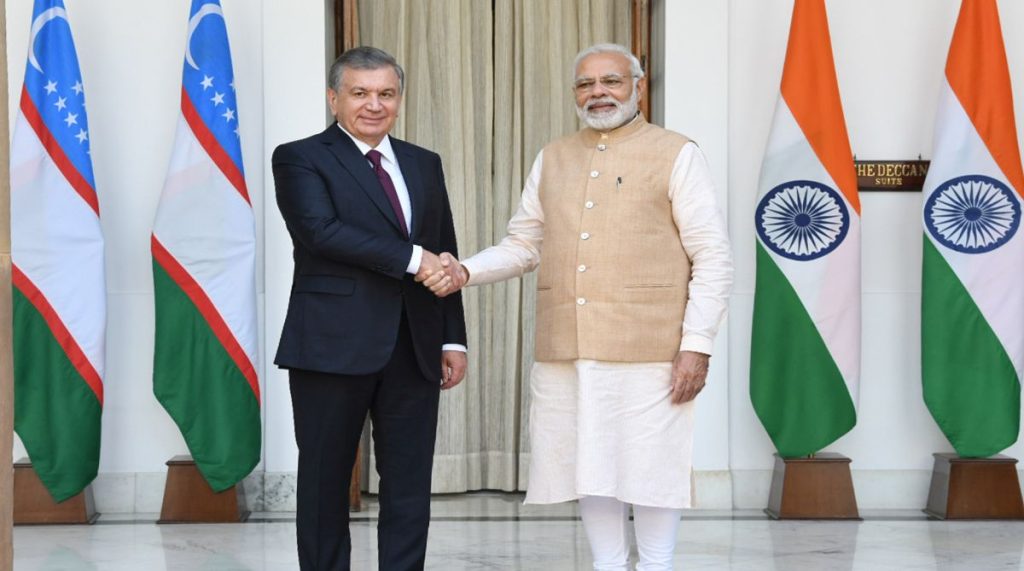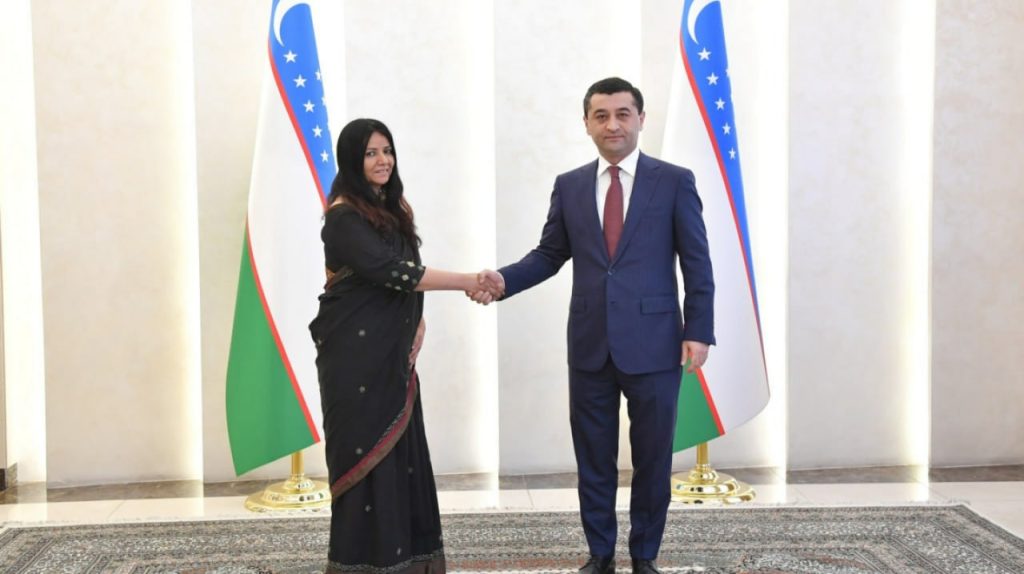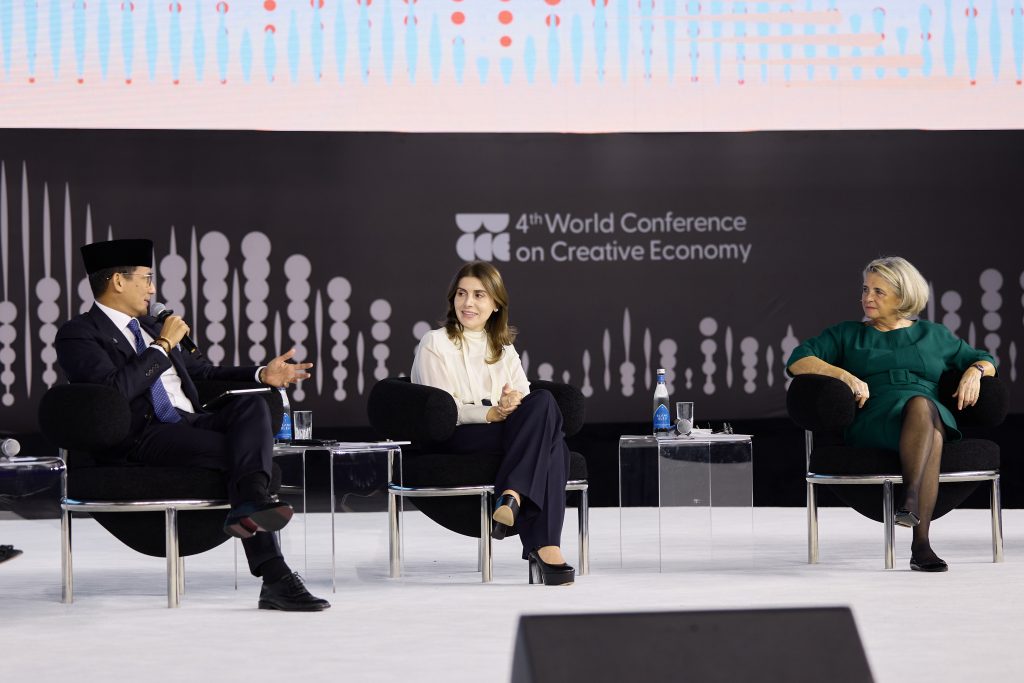
TASHKENT: India’s ties with Uzbekistan have been on a steady upward trajectory, particularly as part of India’s broader engagement with Central Asia. With Uzbekistan’s strategic location near Afghanistan and its rich resources, the two countries are exploring new avenues for cooperation, including energy, trade, and education. At the same time, the bilateral relationship benefits from shared cultural and political histories. In an insightful interview with Manish Chand, CEO, Centre for Global India Insights at the Indian embassy in Tashkent, Ambassador Smita Pant, India’s Envoy to Uzbekistan, discusses the evolving dynamics of India-Uzbekistan relations. From uranium procurement to technology transfers and connectivity challenges, Ambassador Pant highlights the key pillars that underpin the strong bilateral ties and the potential for future collaboration.
Q) How do you see the current state of India-Uzbekistan cooperation? What new areas are the two sides focusing on?
A) India-Uzbekistan relations have a solid foundation, with strong political and cultural ties going back centuries. The partnership is evolving rapidly as we focus on the future. Uzbekistan is a young country with around 37 million people, and half the population is below the age of 30. The leadership has a strong vision for 2030 under “New Uzbekistan.” This aligns well with our own aspirations in India under Viksit Bharat 2047.
In terms of new areas, we are looking at expanding cooperation in renewable energy, agro-processing, artificial intelligence (AI), and the civil applications of nuclear energy. Uzbekistan is rich in rare earth elements. We have an MoU on procurement of uranium from Uzbekistan.
Q) What kind of synergies one can expect between ‘New Uzbekistan’ vision and India’s Viksit Bharat vision. Could you highlight some of the key focus areas?
A) Apart from the shared focus on sustainable development, one of the most important areas is capacity building. The Uzbek leadership is focused on upskilling its youth, and India can be a key partner in this regard. We have a vibrant ITEC scheme under which close to 1,500 Uzbek nationals have been trained in areas like textiles, IT, cyber security, health, banking, agriculture, pest control, science & technology, women empowerment, etc. Going forward, harnessing the potential of youth will be important in taking this strategic partnership forward.
Q) Where exactly do we stand in terms of uranium procurement from Uzbekistan?
A) Uranium shipments from Uzbekistan have already been sent to India. Cooperation in civil nuclear energy was last discussed during the visit of India’s Finance Minister Nirmala Sitharaman to Uzbekistan. We have offered technology in irradiation of agricultural products, water purification, bio-waste, healthcare in which nuclear technology plays a vital role in cancer detection and treatment.
Q) How do you see India contributing to Uzbekistan’s growing textile industry?
A) Uzbekistan is positioning itself as a regional textile hub, and there is great potential for India to contribute in several ways including in investments, fashion, branding and textile machinery. We are very competitive in textile machinery, including spare parts. However, there’s one challenge that needs to be addressed — connectivity. Uzbekistan is landlocked, which creates logistical hurdles for Indian companies. Improving connectivity, both in terms of physical infrastructure and trade routes, will be crucial to unlocking the full potential of this cooperation. Once we overcome these barriers, I believe trade not just in textiles but also other areas will see a significant uptick.
Q) Connectivity is indeed vital. What about the signing of the Bilateral Investment Treaty (BIT). Has it led to an increase in investment?
A) Yes, the signing of the BIT during the Finance Minister’s visit was a landmark moment. This treaty is crucial because it provides much-needed assurance to investors on both sides and creates a predictable investment environment. In the past, some Indian businesses had to withdraw from Uzbekistan.
BIT is a significant step as it offers investors a framework that ensures that their interests are protected. This agreement is expected to catalyze more Indian investments in sectors like healthcare, pharmaceuticals, agriculture, and education. Indian companies are increasingly looking at Uzbekistan as a key destination for investments, and signing of BIT is therefore timely.

Q) Are there any upcoming major investments from Indian companies that we should be watching out for?
A) Indian investments in Uzbekistan currently stand at around $325 million, with 315 joint ventures already operating across various sectors. We are also seeing increasing interest in education, with four Indian universities including Amity, Acharya, Sharda and Sambhram having their campuses in Uzbekistan. This is just the beginning, and I expect further expansion in the education sector as well as other areas like healthcare and agriculture.
Q) Both Uzbekistan and India have so much to offer in terms of tourism. How is developing between the two countries.
A) Tourism is booming. Thousands of Indian tourists have started visiting cities like Tashkent, Samarkand, Bukhara, and Khiva. On the other hand, Uzbeks have long seen India as a prime destination for medical tourism, thanks to our affordable and accessible healthcare services. Golden Triangle is another attraction for them.
Q) Recently, Uzbekistan hosted a conference on the creative economy. What is the scope for cultural collaboration between our countries?

A) Cultural collaboration is another exciting frontier. Uzbekistan, like India, has a rich cultural heritage, and there is significant potential for both countries to collaborate in the creative economy. Cultural industries, including film, art, and music, have the power to engage younger generations and drive economic growth. We are expecting a delegation from India’s Ministry of Culture to Uzbekistan soon. There is much to mutually gain by building partnerships in creative industries and heritage preservation.
Q) On a geopolitical note, Uzbekistan’s strategic location has garnered significant international attention. How do you see India’s role evolving in this competitive space, especially given the proximity to Afghanistan?
A) Uzbekistan shares border with all Central Asian countries and also Afghanistan. The Uzbek leadership has been pragmatic in implementing its foreign policy. We have had exchanges on Afghanistan including working closely within the India-Central Asia framework, which also has a joint working group on Afghanistan. India supports multi-vector policy of Uzbekistan and as a doubly landlocked country, its efforts to access sea routes. Our cooperation with respect to Chahbahar is also important
Q) Lastly, how does Uzbekistan view India’s rise as a global player, especially in the context of increasing Chinese influence in the region?
A) We enjoy a strong and vibrant strategic partnership with Uzbekistan. Our leaders have remained deeply invested in this relationship. I believe we should see this relationship, based on its own merit and not through the prism of any another country.
Author Profile

- Manish Chand is Founder and Editor-in-Chief of India Writes Network (www.indiawrites.org) and India and World, a pioneering magazine focused on international affairs. He is CEO, Centre for Global India Insights, an India-based think tank focused on global affairs.
Latest entries
 India and the WorldFebruary 17, 2026South-by-South: Focus on people-centric solutions at India AI summit
India and the WorldFebruary 17, 2026South-by-South: Focus on people-centric solutions at India AI summit India and the WorldFebruary 7, 2026Modi hails interim India-US trade deal, Goyal says no concessions made on agriculture
India and the WorldFebruary 7, 2026Modi hails interim India-US trade deal, Goyal says no concessions made on agriculture India and the WorldFebruary 2, 2026Trump announces trade deal with India, Modi ‘delighted’
India and the WorldFebruary 2, 2026Trump announces trade deal with India, Modi ‘delighted’ India and the WorldJanuary 31, 2026Palestinian minister bats for mediatory role for India in ending Gaza conflict
India and the WorldJanuary 31, 2026Palestinian minister bats for mediatory role for India in ending Gaza conflict







